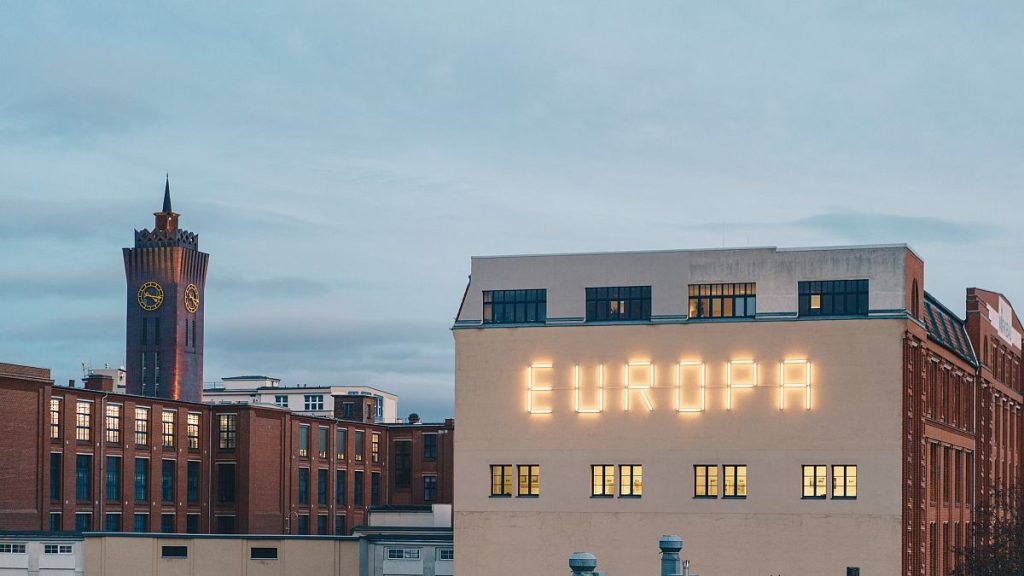Chemnitz, a city in southeastern Germany, has officially embarked on its year as a 2025 European Capital of Culture (ECOC), marking a significant milestone not only for the city but also for the ECOC initiative itself, which celebrates its 40th anniversary this year. The grand opening celebration, expected to draw a massive crowd of between 70,000 and 100,000 visitors, unfolded on Saturday, showcasing a vibrant tapestry of art, music, and cultural performances. The festivities are centered around the iconic Marx Monument, a powerful symbol of the city’s history, particularly its past as Karl-Marx-Stadt during the GDR era. The day-long event featured a diverse program, including performances by renowned actor Alexander Scheer and director Andreas Dresen, alongside local talent like the “Dancing Neighbours” dance project. A “Kitchen of Nations” food market added a culinary dimension to the celebration, reflecting the city’s multicultural heritage.
Chemnitz’s industrial legacy was also prominently featured in the opening festivities. A historic steam locomotive, pulled by volunteers through the city center as part of the “Mitziehen” campaign, symbolized the city’s industrial past and the spirit of collective action driving its future. The day culminated in a series of parties and live music events across various city clubs, setting a vibrant tone for the year-long cultural program. The “C the Unseen” theme will unite over 200 projects and 1,000 events throughout 2025, showcasing Chemnitz’s rich cultural landscape and its commitment to fostering artistic expression.
The year-long program promises a diverse array of cultural experiences, catering to a wide range of artistic interests. A major exhibition of works by Norwegian painter Edvard Munch, who resided in Chemnitz in 1905, is expected to draw art enthusiasts from far and wide. The “Purple Path,” a specially designed trail connecting public art installations by internationally acclaimed artists like Tony Cragg and James Turrell, will offer a unique way to explore the city’s urban landscape. Music lovers can look forward to a marathon route transformed into the world’s longest musical stage, featuring a diverse mix of genres, from classical to hip-hop and electronic music.
The ECOC program also extends beyond the realm of visual and performing arts, encompassing sporting and literary events. A cross-border cycling tour, inspired by the historic Peace Race that once traversed the former Eastern Bloc countries, will celebrate sporting culture and international cooperation. A dance journey inspired by James Joyce’s “Ulysses” will offer a unique interpretation of the literary masterpiece, while the revitalized Kosmos festival will continue its tradition of celebrating democratic values. The Begehungen Festival, meaning “Inspection,” will transform a former lignite mine into a contemporary art gallery, showcasing the city’s ability to repurpose industrial spaces for cultural expression.
While the ECOC celebrations promise a year of vibrant cultural exchange and artistic exploration, the opening day was also marked by a planned rally by right-wing groups, highlighting the ongoing challenges faced by the city. In response, the German Trade Union Confederation organized a counter-demonstration, advocating for unity and against hate, with thousands of participants expected to join the call for tolerance and inclusivity. This juxtaposition of celebration and protest underscores the complex social and political landscape in which the ECOC program unfolds.
The ECOC title is not exclusive to Chemnitz in 2025. In a historic first, the twin cities of Gorizia, Italy, and Nova Gorica, Slovenia, will share the title in February, marking the first time the ECOC initiative has recognized a cross-border region. This unique designation underscores the power of culture to transcend political boundaries and foster cooperation and understanding between nations. The joint ECOC program in Gorizia and Nova Gorica will further enrich the 2025 cultural landscape, offering a compelling example of how cultural exchange can bridge divides and promote a shared European identity. The two cities, separated by a border but united by a common history and cultural heritage, will use the ECOC platform to showcase their unique cross-border identity and explore the potential for cultural diplomacy in fostering peaceful coexistence.














